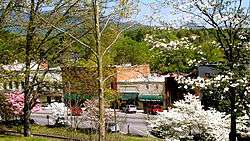
Rolla M. Tryon Jr.
Rolla Milton Tryon, Jr. (August 26, 1916 – August 20, 2001) was an American botanist who specialized in the systematics and evolution of ferns and other spore-dispersed plants (pteridology). His particular focus and interest lay in two areas, historical biogeography of ferns and the taxonomy of tropical American ferns.
Biography
Rolla Milton Tyron Jr. was born August 26, 1916, in Chicago. His father was an American history and education professor at the University of Chicago.
Tyron's first scientific paper was published in 1934 on the ferns in Chesterton, Indiana where his family’s summer cottage was located. In 1935, he received an A.A. degree and in 1937 his B.S. both from the University of Chicago. He enrolled in the University of Wisconsin for a Ph.M., graduating in 1938. He attended Harvard, earning both an M.S. in 1940 and a Ph.D. in 1941. While at Harvard, he was influenced heavily by Merritt Lyndon Fernald and Charles Alfred Weatherby.
During World War II, he worked as a lab technician in the U.S. Chemical Warfare Service at the Massachusetts Institute of Technology. After the war, he returned to teaching at Dartmouth College and the University of Wisconsin, where he met his future wife and lifelong collaborator, Alice Faber, a student at the time. In 1947, Tyron joined the faculty at Washington University in Saint Louis as an associate professor of Botany and became assistant curator in the herbarium of the Missouri Botanical Garden.
Tryon
Tryon may refer to:
People
Places
Other uses

Tryon, North Carolina
Tryon is a town in Polk County, North Carolina, United States. As of the 2010 census, the city population was 1,646. Located in the escarpment of the Blue Ridge Mountains, the area is a center for outdoor pursuits, equestrian activity and fine arts.
Tryon Peak and the Town of Tryon are named for William Tryon, Governor of North Carolina from 1765 to 1771 in recognition of his negotiation with the Cherokee for a treaty during a bloody period of conflict during the French and Indian War.
History
Cherokee
The area now known as Tryon was originally part of the Cherokee nation of Western North Carolina, archaeological evidence dates their occupation of the site to the end of the last Ice Age more than 11,000 years ago and semi-permanent villages appeared by 8,000 B.C. They later settled in towns with a democratic political structure, religion, domesticated crops, pottery and skilled, powerful archery. Each village had a peace chief, war chief, and priest and survived through growth of vegetables, hunting and fishing.
Tryon (surname)
Tryon is a surname. Notable people with the surname include:
Podcasts:

